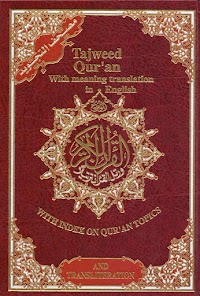Website of Rasoulullah (peace be upon him)
Language: English | Format: PDF | Items: 2 | Pages: 17+2 | Size: 15 MB
In the name of Allah, All praises be to Allah, All Prayers and Blessings of Allah be upon Prophet Muhammad, his family and companions.
Election is one of Allah’s enactments in this universe. Allah (SWT ) elected some prophets, angels, months and days to be better than others. For example, Allah (SWT) elected the first ten days of Dhul-Hijjah to be better than any other days. Let us know their virtues and the best righteous deeds we can do during them.
First: Their virtues mentioned in the Qur’an and Sunnah
1) Allah (SWT)1 says in the Noble Qur’an what can be translated as:
“And (by) the dawn and (by) the ten nights .” (TMQ , Surat al-Fajr 1-2) Ibn-Kathir said: “The ten nights are the first ten nights of Dhul-Hijjah as stated by Ibn-Abbas, Ibn-al-Zubair, Mujahid, and many others scholars, both past and present.”
2) Ibn-Abbas reported that the Prophet (SAWS )2 said:
“No good deeds done on other days are superior to those done on these (first ten days of Dhul-Hijjah).” Then some companions of the Prophet (SAWS) said, “Not even jihad (struggle)?” He replied, “Not even jihad, except that of a man who does it by putting himself and his property in danger (for Allah’s sake) and does not return with any of those things.” (Related by al-Bukhari)
3) Jabir reported that the Prophet (SAWS)3 said: “The best days are the (first) ten days (of Dhul-Hijjah).” (Related by Ibn- Habban and Abu-Ya’la and ranked as hadith sahih by al-Albani)
Second: Recommended Righteous Deeds
There have been many narrations that indicate the worshipping efforts exerted by our predecessors during these days. Said ibn-Jubair “exerted his best efforts in worship once the first ten days Dhul-Hijjah started until he almost could not.” He used to advise people not to sleep a lot during these nights and spend them in prayer.
The following are the most important righteous deeds that can be done during these days:
1) Fasting
Hunaydah ibn-Khalid reported from his wife on the authority of one of the wives of the Prophet (SAWS) who said, “The Prophet of Allah (SAWS) used to fast the first nine days of Dhul-Hijjah, the Day of `Ashura’ (10th of Muharram) and three days of every month, that is, the first Monday (of the month) and Thursday.” (Related by Abu-Dawud and ranked as hadith sahih by al-Albani)
Fasting on the Day of `Arafah (9th of Dhul-Hijjah) is particularly important:
Abu-Qatada al-Ansari (RA ) reported that the Prophet of Allah (SAWS) was asked about … fasting on the Day of `Arafah (9th of Dhul-Hijjah), whereupon he said, It expiates the sins of the preceding year and the coming year.” (Related by Muslim)
2) Remembrance of Allah
Allah (SWT) says in the Noble Qur’an what can be translated as: “That they may witness (things) profitable to them and mention the Name of Allah on days well-known.” (TMQ, Surat al-Hajj 28) Ibn-Abbas said that the “days well-known” are the first ten days of Dhul- Hijjah while the “prescribed number of days” are the Days of Tashriq (11th, 12th and 13th of Dhul-Hijjah). Ibn-Omar and Abu-Hurairah used to go to the marketplace reciting takbir (saying: “Allahu Akbar [Allah is the Greatest]”) and people followed their example.
3) Sacrifice
Abu-Hurairah reported that the Prophet (SAWS) said, “The one who is able to offer a sacrifice but he does not should not attend our mosque.” (Related by Ibn-Majah and ranked as hadith hasan by al-Albani)
4) `Umrah (lesser pilgrimage)
In his tafsir (interpretation) book, Ibn-Jarir mentioned that Ibn-Omar said he would like to perform `umrah in Dhul-Hijjah better than in the twenty (that is the last ten days of Ramadhan and the first ten days of Muharram).
5) Du`a’ (supplication)
In his book The Two Eids al-Firyabi mentioned that Abu-Musa al-Ash’ari said that the first ten days of Dhul-Hijjah are the “days well-known” mentioned in the Noble Qur’an and supplications are granted during them.
The Prophet (SAWS) said, “The best thing Allah likes is supplication.” (Related by at-Tirmithy and ranked as hadith hasan by al-Albany)
One should be certain that he will never be deprived of the goodness of supplication. The Prophet (SAWS) said, “The Muslim whose supplication does not include sin or break of kinship ties shall be granted one of three things: his supplication is granted, kept for him in the hereafter or protects him of bad things the equal of which.” The companions then said, “We shall supplicate more and more.” “Allah is more,” said the Prophet (SAWS). (Related by Ahmad and ranked as hadith hasan sahih by al-Albany)
–
Index:
First: Their virtues mentioned in the Qur’an and Sunnah
1) Allah (SWT) says in the Noble Qur’an what can be translated as:
2) Ibn-Abbas reported that the Prophet (SAWS ) said:
3) Jabir reported that the Prophet (SAWS) said:
Second: Recommended Righteous Deeds
1) Fasting
2) Remembrance of Allah
3) Sacrifice
4) `Umrah (lesser pilgrimage)
5) Du`a’ (supplication)
6) Khatmah (completing of one reading of the whole Qur’an)
8) Love that takes You into Paradise
9) Maintaining the ties of kinship
10) Visiting the Ill Project
11) Joy Project
12) Project of Waiting Prayer at the Mosque
13) Learning Session at the Mosque
14) Clearing Repentance
15) Easy Actions, Multiple Rewards
16) Paradise Palaces
–
Direct Downloads:
Download Ten Days Of Dhul Hijah Book
Download Ten Days Of Dhul Hijah Brochure
Download













Post a Comment
EmoticonClick to see the code!
To insert emoticon you must added at least one space before the code.